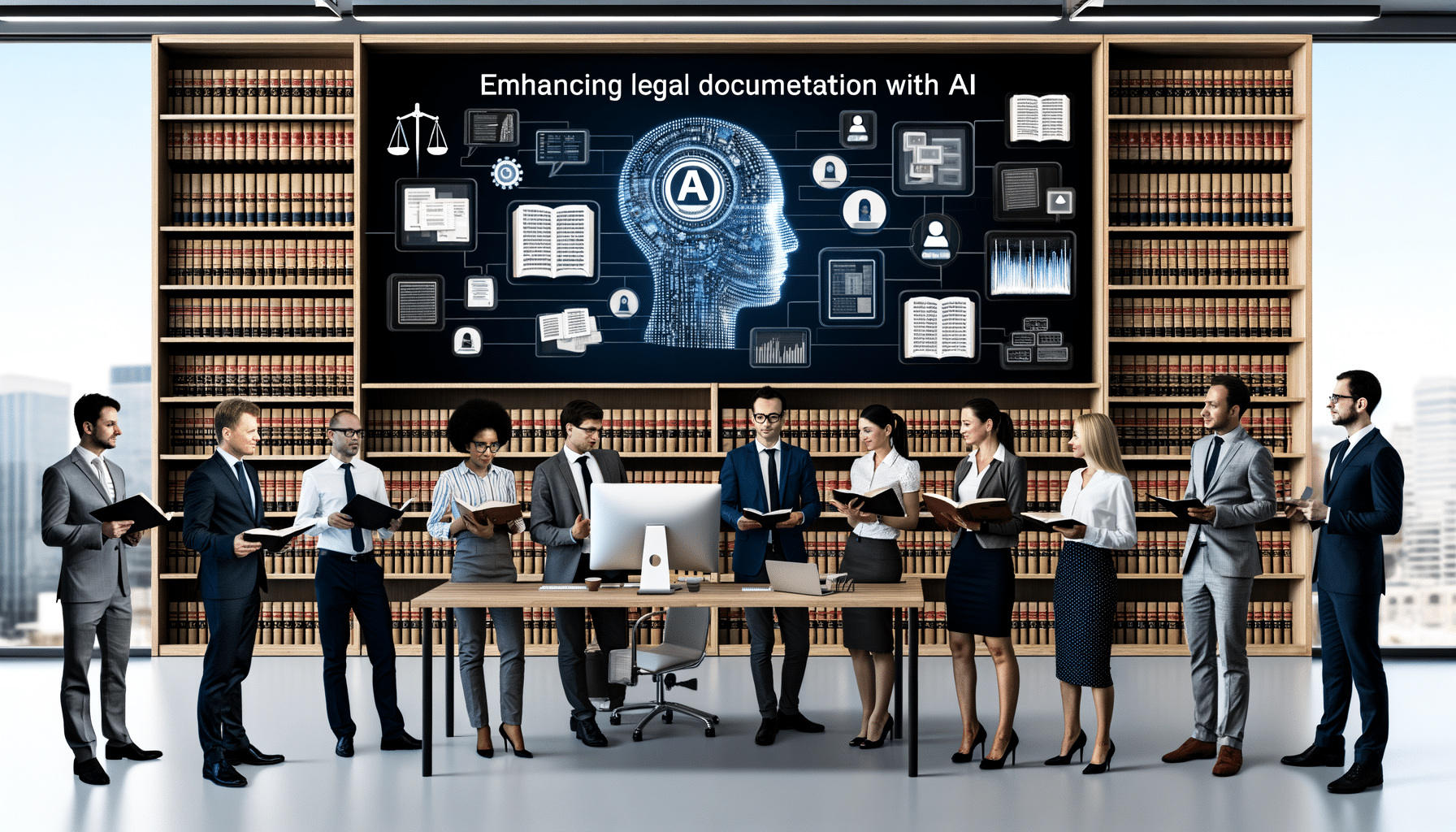- AI in Legal
- November 16, 2024
Enhancing Legal Documentation with AI

As someone who has been deeply engaged in both the tech industry and the legal landscape for years, I’ve witnessed unprecedented transformation thanks to emerging technologies. One of the areas undergoing significant evolution is legal documentation, where artificial intelligence (AI) is dramatically rewriting the rules of efficiency and accuracy. The manual handling of legal documents—once a time-intensive and error-prone process—has been revolutionized by AI integration, creating a new, streamlined future for legal professionals.
Understanding the Challenges in Legal Documentation
For those of us who have navigated the meticulous corridors of legal documentation, the challenges have been well-known. There is the sheer volume of documents, the complexity of legal language, and the critical importance of accuracy. All these factors combine to make the traditional document management process not only challenging but often overwhelming.
In legal departments, the pressure to maintain meticulous records and ensure compliance is ever-present. However, the conventional methods of manually cataloguing and retrieving documents often lead to inefficiencies and, sometimes, costly mistakes.
How AI is Transforming the Legal Sector
The advent of AI has paved the way for a transformation in how legal documents are handled. By leveraging AI, we can now automate many of the repetitive and tedious tasks that once bogged down legal professionals. Here’s how AI is reshaping the landscape:
1. Automated Document Classification: AI’s ability to automatically classify and tag documents means we can now easily organize legal documentation with minimal human intervention. This not only saves time but also significantly reduces human error.
2. Natural Language Processing (NLP): AI systems harness NLP to interpret the nuanced language found within legal documents. By doing so, it becomes possible to process documents more accurately and swiftly.
3. Enhanced Data Retrieval: AI solutions provide robust data retrieval capabilities. Queries made in natural language can swiftly pinpoint specific documents or segments within large volumes of text, enhancing the efficiency of legal research and analysis.
4. Augmented Compliance: With AI, compliance isn’t just more manageable; it’s automated. AI can continually monitor for compliance with legal standards—streamlining audits and ensuring adherence to crucial regulations.
Real-World Benefits of AI in Legal Documentation
Let’s talk about how these AI-driven efficiencies translate into real-world benefits for legal teams and organizations:
- Time Savings: By eliminating the drudgery of manual filing and retrieval, legal teams can focus on strategic tasks, resulting in notable productivity gains.
- Cost Reduction: Reduced time spent on labor-intensive processes often leads to decreased operational costs.
- Improved Accuracy: By minimizing human involvement in rote processes, AI enhances the accuracy of document handling.
- Increased Security: Enhanced data control and protection through AI increases security for sensitive legal documents, safeguarding client confidentiality.
Integrating AI with Blockchain for Unparalleled Efficiency
One of the key innovations at RecordsKeeper.AI is the fusion of AI with blockchain technology. This innovative integration offers unparalleled efficiency in legal documentation by providing a tamper-proof, immutable ledger. This ensures data integrity and traceability—key components when considering the legal chain of custody and evidentiary standards.
Blockchain’s inherent qualities ensure that once data is entered, it cannot be altered, which is crucial for maintaining the legitimacy of legal documents. This makes it indispensable for legal departments facing increasing regulatory scrutiny.
Case Study: AI in Action
Let me illustrate this with a real-world example. A law firm implementing RecordsKeeper.AI managed to reduce their document processing time by 50%. Through AI, they automated the categorization and retrieval of complex client files, freeing up their legal team to engage more effectively with clients and focus on case strategy. The integration with blockchain technology provided added peace of mind about document integrity and security.
Conclusion: The Strategic Advantage
As we continue to embrace these innovations, AI proves to be more than just a convenience—it’s a strategic advantage in legal documentation. It empowers legal teams to not only perform their duties with higher accuracy and efficiency but also to embrace a more innovative approach to legal record management.
To those navigating the world of legal documentation, the time to explore AI is now. The transformative impact of AI on legal documentation cannot be overstated—it is about setting the pace for a smarter, more efficient legal practice. For those seeking more insights or resources, I invite you to explore how RecordsKeeper.AI can prepare you for the future of legal documentation management.
Let’s unlock the potential of AI in legal documentation together.
Toshendra Sharma is the visionary founder and CEO of RecordsKeeper.AI, spearheading the fusion of AI and blockchain to redefine enterprise record management. With a groundbreaking approach to solving complex business challenges, Toshendra combines deep expertise in blockchain and artificial intelligence with an acute understanding of enterprise compliance and security needs.
Related Posts


Archives
- December 2024
- November 2024
- October 2024
- September 2024
- August 2024
- July 2024
- June 2024
- May 2024
- April 2024
- March 2024
- February 2024
- January 2024
- December 2023
- November 2023
- October 2023
- September 2023
- August 2023
- July 2023
- June 2023
- May 2023
- April 2023
- March 2023
- February 2023
- January 2023
- December 2022
- November 2022
- October 2022
- September 2022
- March 2019
Want to get more content like this?
Signup to directly get this type of content to your inbox!!
Latest Post
Organizing External Auditor Access
- December 22, 2024
Document Control in Manufacturing Plants
- December 21, 2024
Handling Rush Financial Report Requests
- December 20, 2024
Managing Record Access After Staff Changes
- December 19, 2024





